Player-centric narratives: Add AI NPCs, boost player agency
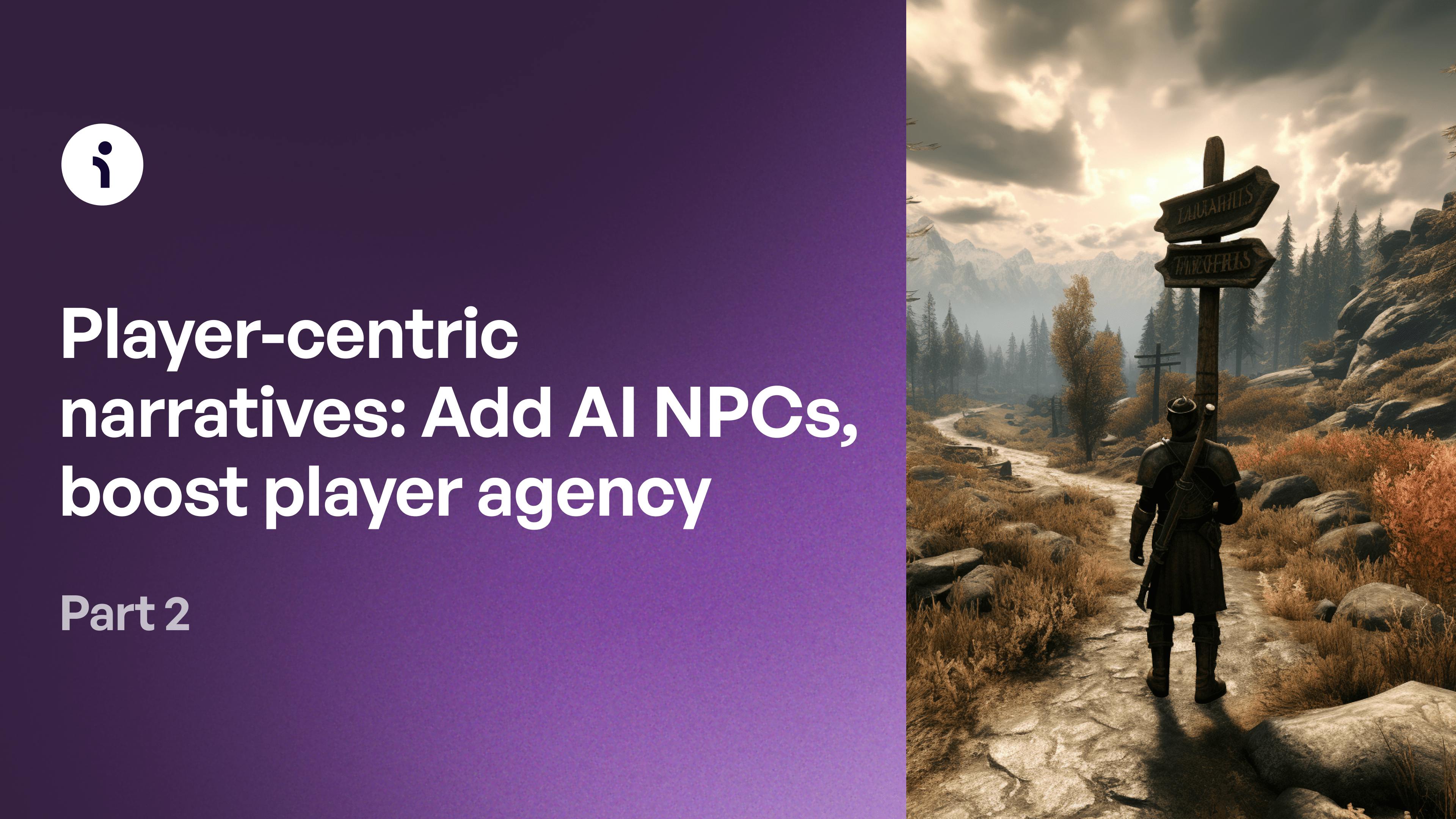
This is part 2 of a 3 part blog series examining the impact of AI NPCs on game narratives and narrative design. In this post, we examine how AI NPCs help boost player agency – across all types of narrative. Read Part 1 and Part 3.
The shift from using deterministic to non-deterministic AI to power NPCs revolutionized games and unlocked new types of gameplay and mechanics. With the emergence of generative AI-powered NPCs, the same will occur. Those newly possible mechanics and gameplay experiences will allow game devs to extend an unprecedented amount of agency in video games.
As we saw in the first post in this series, that greatly impacts a player’s sense of flow in video games – which improves replayability and engagement. In this post, we'll look what player agency looks like with AI NPCs.
Customize the level of player agency with AI NPCs
One way to think about the shift AI NPCs are going to bring is as a move from primarily design-time creation to runtime creation. The current way of making games has developers often exercising complete control over the range of experiences that players can have. Even when devs want to provide more player agency and meaningful choices, each branch on the behavior or dialogue tree is created in advance.
Games with AI NPCs, however, present the opportunity for runtime creation. Everything from the dialogue an AI NPC says and the personalities of key NPCs to key game narrative plot points could be decided while a player is playing the game. That gives gamers an unprecedented level of player agency. Indeed, it makes narratives ‘player-centric’ in a way they never could be before.
If game devs want to provide players with ‘unrestricted player agency,’ they now can. But they can also just leverage AI NPCs to give gamers the greater sense of agency and personalization they crave within games where the greater narrative control is still more balanced or weighted towards the developer.
AI NPCs: Dialogue-focused player agency
Here are just a few examples of how just the ability to talk to AI NPCs freely can be used to extend significantly more player agency to gamers. While AI NPCs expand what’s possible around player interaction, game developers can extend – or limit – those abilities to players in ways that fit with the path or experience that the developer is trying to create in the game:
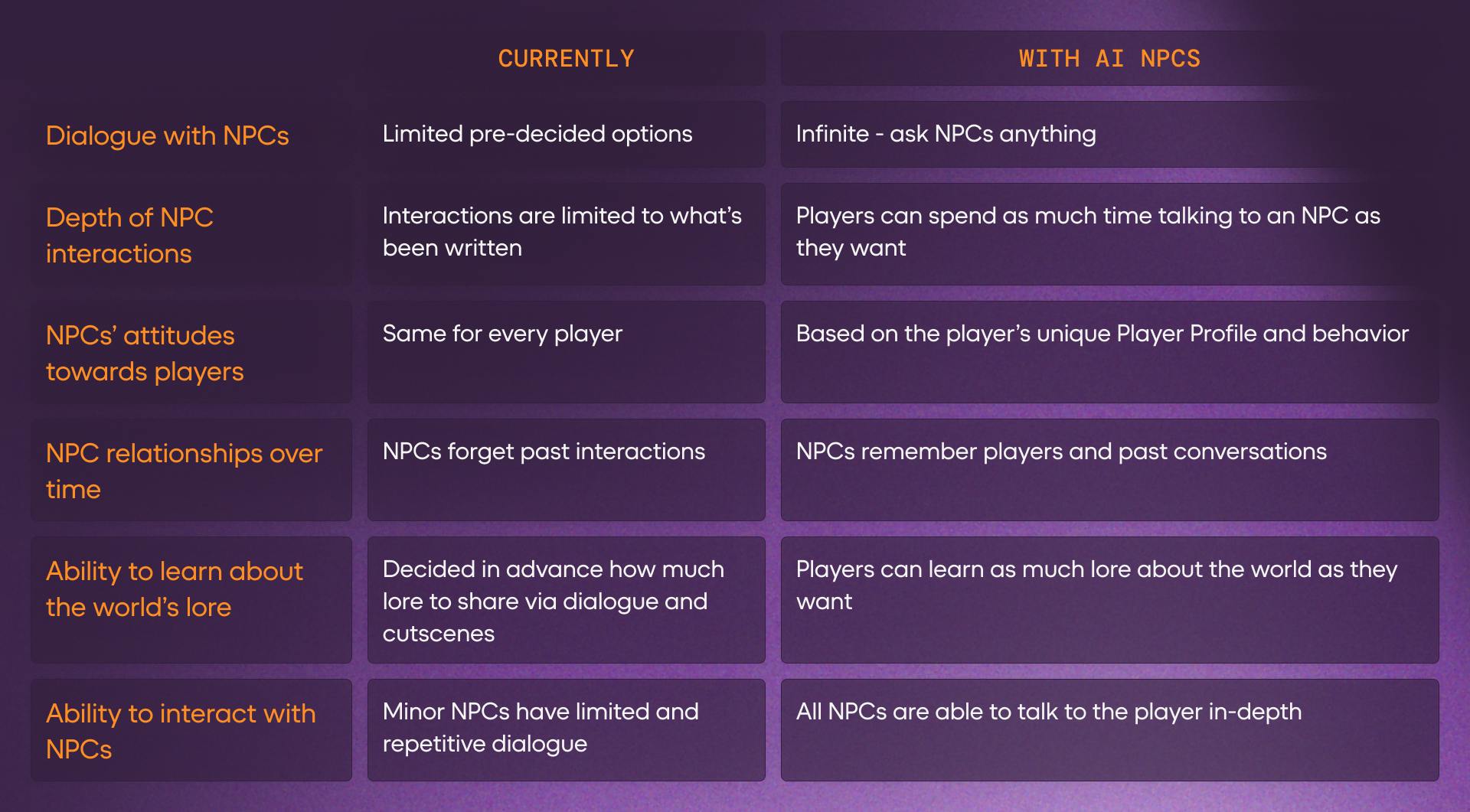
While none of the examples above necessarily impacts broader game narratives or represent the type of meaningful choices or branching paths that affect the outcome of a game, all of these examples provide the gamer with a much greater ‘perceived’ sense of agency, which research found was still able to increase the player’s sense of player agency and flow in video games.
AI NPCs: Agency to impact the narrative
But where AI NPCs really provide players an increased sense of agency in video games, however, is in how they can be used as key mechanics to substantively impact the game narrative. Here are some examples showing how AI NPCs will greatly shift player agency:
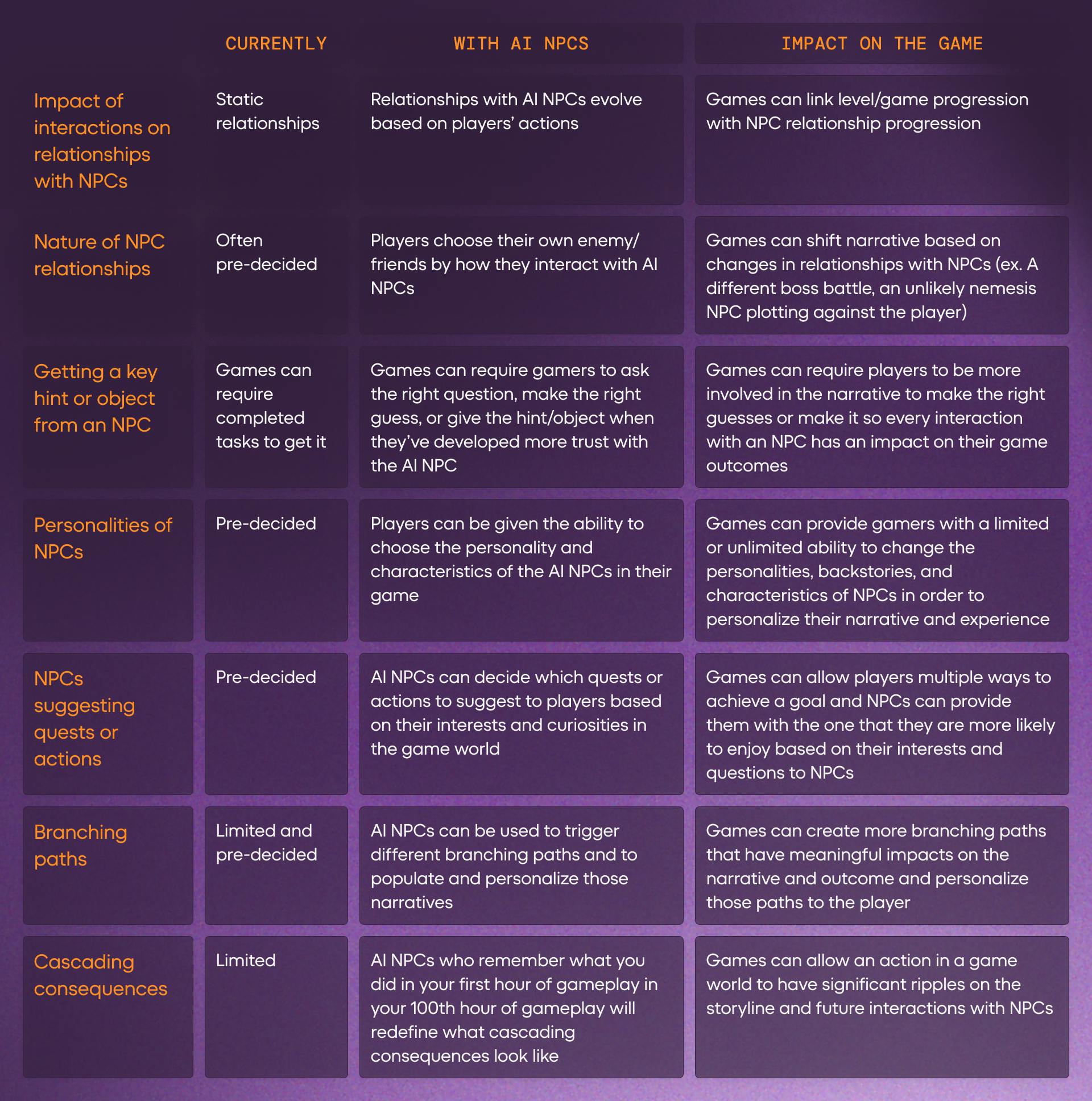
As you can see, the affordances for player agency expand exponentially with AI NPCs – giving game devs new abilities to personalize their video games to players and give players the agency to dynamically impact game narratives – without adding huge development and production costs.
6 dimensions of player agency
Research on player agency found it has six dimensions:
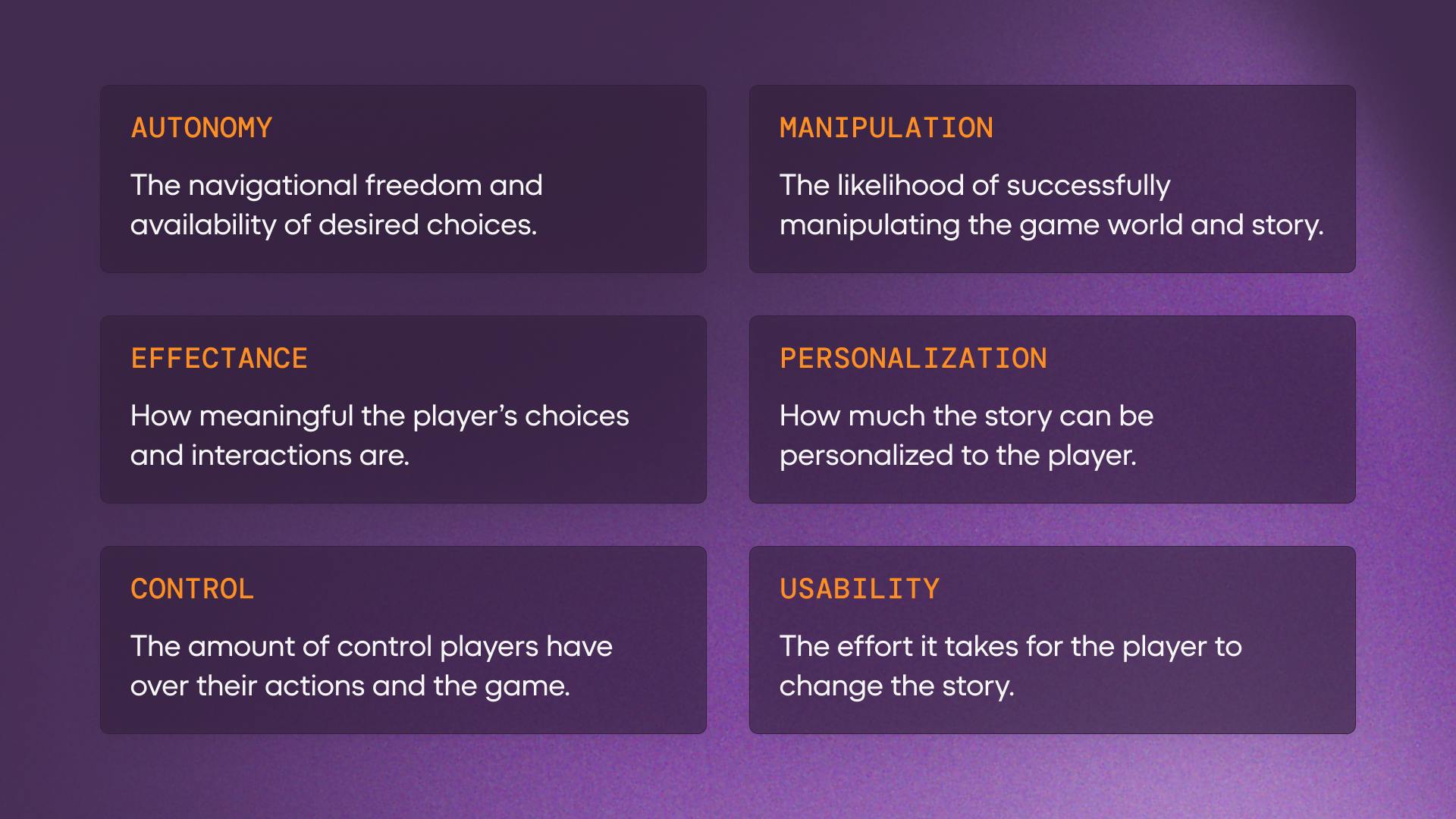
3 core aspects of player-centric narratives
There are three core features of player-centric narratives that make them effective at keeping gamers engaged and creating games with infinite replayability.
Personalized interactions
With AI NPCs, all interactions a player has in the game world are personalized to them.
On the most superficial level, that means gamers can decide what to talk to an AI NPC about and how long to talk to them. Gamers that love chatting with NPCs can spend hours chatting with their favorites. Meanwhile, gamers that hate chatting with NPCs can skip talking to them altogether. This allows gamers to create their own experience of the game customized to their preferences and curiosities.
For example, if they want to know who shot an arrow into a particular Skyrim NPC’s knee, they can finally hear the full story. Or if they want to heckle the big boss until he petulantly explodes, that’s also their prerogative!
Players can play an active role in customizing the game to their preferences. Just by listing that their character is from one faction rather than another in their Player Profile, for example, players can impact how every AI NPC they encounter in the game interacts with them. They could also be given the ability to customize AI NPC’s personalities and even update those personalities in real time. Want an NPC to be a little funnier? Just change their personality!
This type of personalization won’t just make a game feel hyper-customized to players, it will allow them to change things about the game world they don’t like in order to make it more enjoyable to them. This will help players feel a greater sense of agency and ownership over their experience. As research shows that customization increases player autonomy, it will also give them a greater perception of player agency and control.
All this helps to significantly increase replayability. AI NPCs won’t just say slightly different things on each playthrough – that difference can be significant. By interacting with NPCs differently, assigning them different personality traits, deciding to list a different faction in their Player Profile, and making different choices, players can make their next playthrough almost feel like an entirely different game. That’s a recipe for games with infinite replayability!
Player-directed narrative journeys
With AI NPCs, players are in control of directing their narrative journey like never before.
Even small things can have a significant impact on both gamers’ experience in the game world and the outcome of the narrative. For example, every interaction with an NPC suddenly becomes meaningful when AI NPCs will remember it later in the game. Those same NPCs can then choose to help or hinder the player levels later based on their previous interactions.
Gamers can also trigger new cascading consequences, branching paths, customized quests, and narrative directions through interactions with AI NPC-powered mechanics like relationship progressions and Goals and Actions triggers. What they talk to NPCs about could also be used to suggest places players should explore or quests to go on. All this added agency leads to a truly unique gameplay experience and increased – or even infinite replayability.
Research shows unique gameplay is something gamers crave. In one study a gamer described their excitement for Zelda: Breath of the Wild as being based on the unique gameplay experiences that it afforded. “The game is built on this system with all these physics and interactions, and playing with this set of rules you can create interesting, unexpected consequences, and I think everyone comes out of it with these unique experiences that they had and that's almost as much a part of the story as anything else.”
Unique narrative consequences
With AI NPCs, games can have more meaningful choices, branching paths, and cascading consequences.
With the research showing that the more meaningful choices gamers have, the more they feel a sense of agency in video games, AI NPCs are a great opportunity to give gamers more player agency than they’ve ever had before. Game developers can much more easily add more meaningful choices and branching narratives to their games – without the same development cost required for each new path.
Instead, AI NPCs can be passed information about changes from the blueprints or a player decision can be set up to trigger one of their Goals and Actions. The NPC will then interact with the character with the knowledge of that choice or suggest a different quest, take an action in response, or have that change the NPC’s relationship level with that character.
NPC’s memory and relationship systems that track the nature of AI NPC and player interactions to determine their relationship state means that every small action can have cascading consequences. You can set up a Goals and Actions trigger for an AI NPC to attack a player if the player loses their trust by being rude to them in interactions. Or you can give your players the choice to defeat the big boss the traditional way by defeating him in battle or by gaining his trust slowly over many interactions until he becomes your best friend.
AI NPCs introduce additional variables that can dramatically shift the game narrative depending on how the player interacts with the game’s NPCs on that playthrough. That will motivate gamers to try playing the game in different ways in order to see what kinds of unique narrative consequences they end up with.
4 types of player agency
Player agency is not just one thing. Cole and Gillies have identified 4 types:
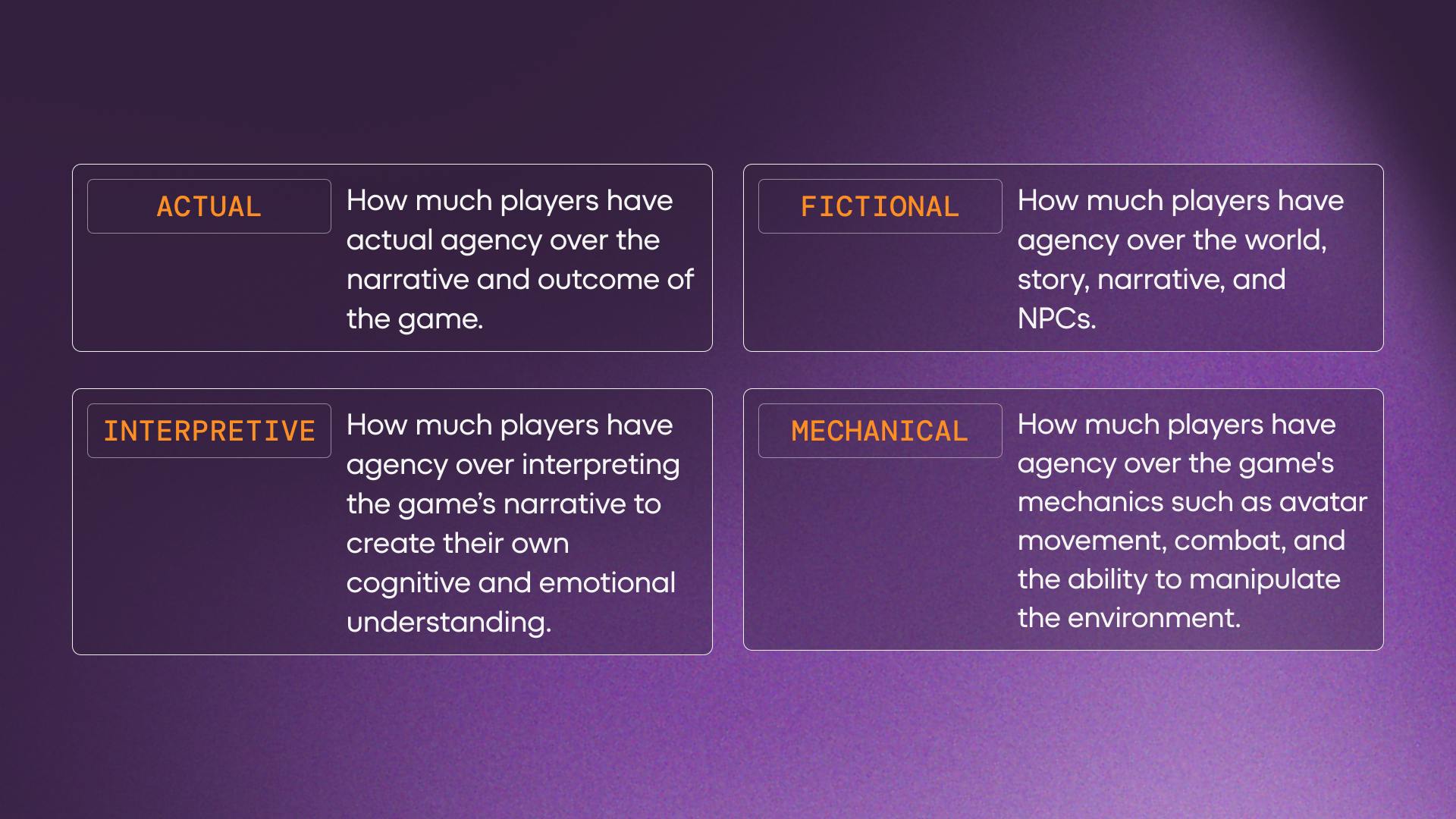
Why Inworld?
At Inworld, we understand the importance of narrative in games – both to pique gamers’ interest and to keep them playing. Our goal is to build a Character Engine with the features developers need to deploy AI NPCs that enhance games across a wide variety of game narrative types and genres. We're committed to helping developers improve their players' experience and boost their metrics by giving gamers more player agency in the game worlds they love.
In the next post in our three part series, we talk about how narrative design is set to change with AI NPCs and how to incorporate additional player agency using AI NPCs in game narratives of all types.
Curious about AI NPCs? Check out our Case Studies to see how they’ve been used in games – and sign-up for our Studio today!